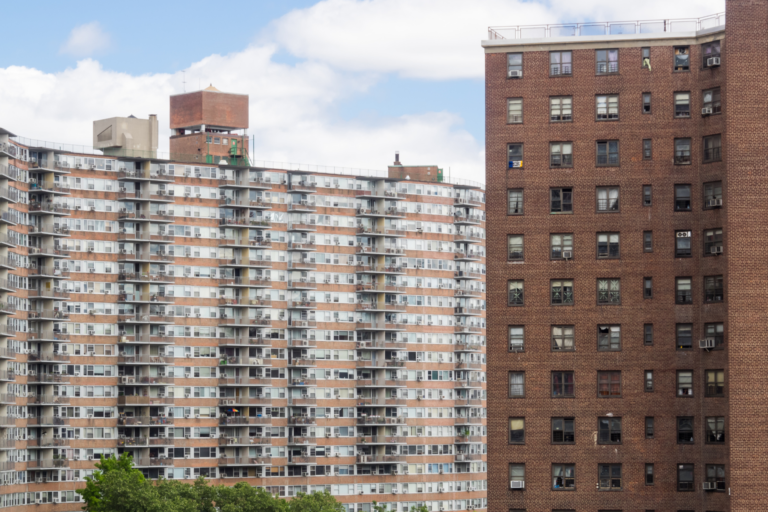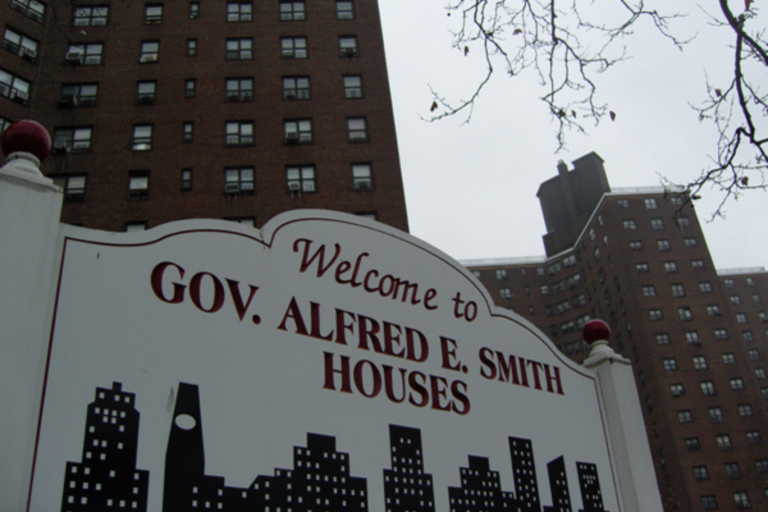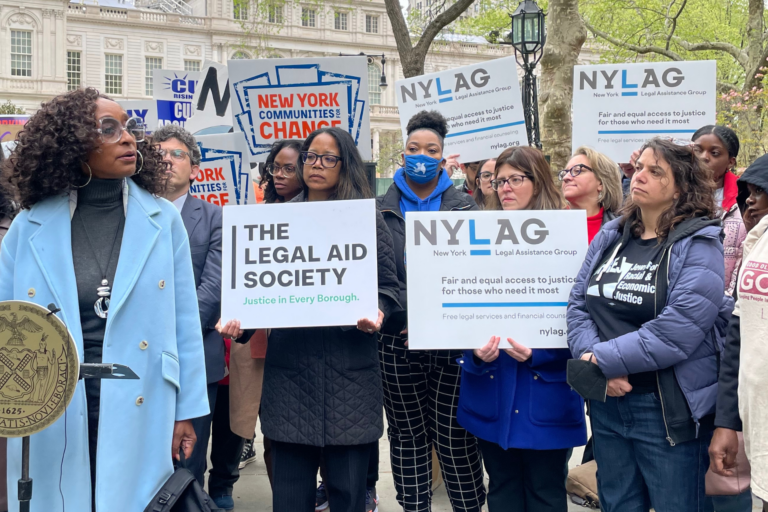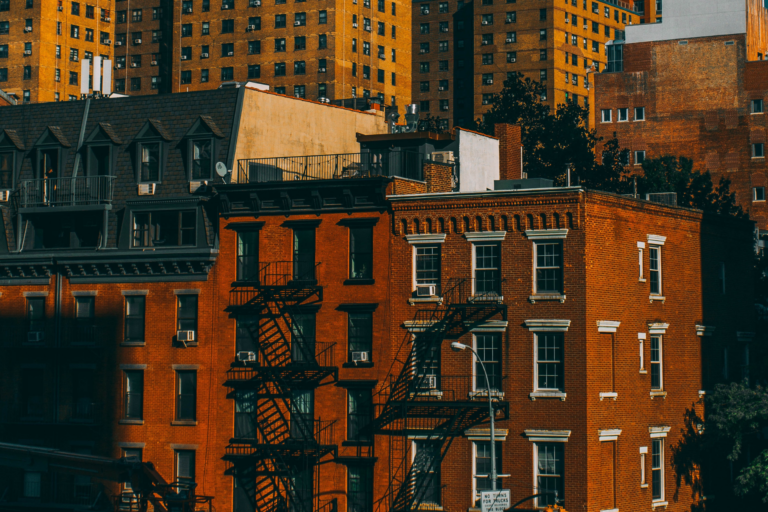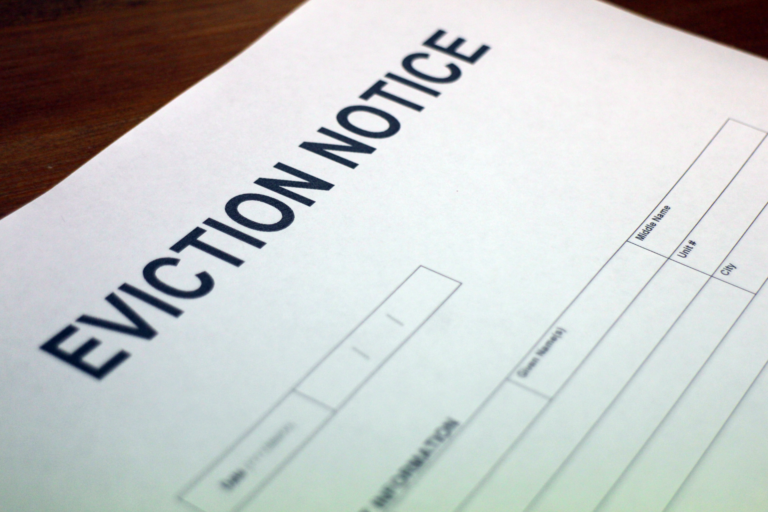There is an important upcoming deadline relevant to tenants’ rights that you should know about. New York tenants experiencing financial hardship have until February 26th, 2021 to fill out a Hardship Declaration and submit it to their landlord or the Housing Court. Doing so will only take tenants only a few minutes, but will provide added protection for tenants against evictions until May 2021.
On February 16th, 2021, NYLAG held a live Q&A that explained the importance of and the process to submit hardship declaration applications and answered common questions on issues tenants are facing during the pandemic. Watch the pre-recorded video and/or read the answers to the frequently asked questions from the Q&A session below.
Frequently Asked Questions (FAQs):
With the passage of the COVID-19 Emergency Eviction and Foreclosure Protection Act (“EEFPA”), Governor Cuomo’s executive order eviction moratorium is no longer in effect. Instead, on December 28, 2020, the legislature passed EEFPA, which Cuomo signed immediately. This law puts into effect a stay on almost all eviction cases until February 26, 2021. If tenants provide the court or their landlord with a Hardship Declaration, the stay will be extended from February 26, 2021 to May 1, 2021.
Yes. EEFPA is clear that the moratorium would be extended by changes in federal law and the state legislature could also vote to extend the stay in EEFPA on its own. The Centers for Disease Control and Prevention (CDC) recently extended the eviction moratorium nationwide until March 31, 2021. However, it’s not entirely clear at this time that the federal eviction moratorium will be extended to September 2021. Because the NYS eviction moratorium is now more protective than the federal one, the federal moratorium does not apply.
At the very beginning of the Biden administration, there was talk about the federal eviction moratorium being extended by Congress legislatively until September 2021 as part of the $1.9 trillion COVID relief package. Lately, it seems like the relief package will only be able to pass Congress through a complicated legislative budgetary procedure called reconciliation. Because the eviction moratorium likely wouldn’t be considered budgetary in nature, it’s unlikely that the extension of the eviction moratorium on the federal level could become law through reconciliation. Consequently, under current Senate rules, which include the filibuster, it would likely require 60 votes in the Senate for an extension of the eviction moratorium to become law nationally.
It’s possible the CDC could extend its eviction moratorium beyond March 31, 2021 and it’s also possible that federal Senate Democrats may reform the filibuster to allow them to pass federal laws more easily. It’s also possible the New York legislature may extend the EEFPA eviction moratorium protection to last longer, but everything related to the New York eviction moratorium after May 1, 2021 remains quite uncertain at this time.
For the vast majority of New York tenants facing hardship since March 7, 2020, there are very few, if any, negative consequences to submitting a hardship declaration. Generally speaking, if someone might be eligible to sign a Hardship Declaration, but has sufficient money to resolve a case with their landlord at this time, it’s probably better to do so than to seek a delay, but those in this situation can still submit a Hardship Declaration as insurance of extra protections and still proceed to resolve issues with their landlord on a parallel track.
The main negative consequence would be for the very narrow subset of tenants who are eligible for the special subsidy called the Family Homelessness Eviction Protection Supplement (FHEPS). Generally speaking, a household is only eligible for FHEPS if they are currently receiving Public Assistance benefits, have minor children in the household, have an active eviction case in court, have rent arrears less than $9,000, and rent an apartment that falls within the FHEPS rental limit guidelines. For tenants who are eligible for FHEPS, it is likely not advisable to do anything to stop your landlord from filing a Housing Court case if they haven’t already. We also don’t advise you to do anything to delay your Housing Court case because you want to do everything in your power to keep your rental arrears as low as possible—delaying your case will lead to your rent arrears increasing. Once a family begins receiving FHEPS, FHEPS will cover the rent arrears and most of the family’s ongoing rent.
There may be other specific issues related to individual tenants. If you have any doubts about whether you should complete a Hardship Declaration, you should try and speak to a lawyer as soon as you can so you can get advice specific to your situation. You can call our hotline at 929-356-9582 7 am-1 pm, Monday-Friday.
It’s important to note that tenants should only complete the Hardship Declaration if they can do so truthfully.
Yes. EEFPA does have an exception, which allows for eviction cases to proceed only in cases where a tenant is “engaging in behavior that substantially infringes the use and enjoyment of other tenants or occupants or causes a substantial safety hazard to others.” The court system and landlords’ attorneys have been referring to these as “nuisance cases,” but that’s not completely accurate under the language of EEFPA. In fact, the Housing Court in New York City has created a special Nuisance Part to handle these cases that may be exempt from the stay required by EEFPA. Any tenant who has a case in the Nuisance Part should definitely appear at the scheduled virtual appearance. At the virtual appearance, tenants will have the opportunity to retain a lawyer to represent them for free through NYC’s Right to Counsel law. Tenants should always be represented in eviction cases, especially cases where a landlord alleges nuisance behavior.
First, remember that a landlord cannot evict you without first taking you to court. That means before you can lose your home, your landlord must go through the following steps:
- Your landlord must send you a formal rent demand for payment of any rent due. Landlords must give you at least 14 days to pay the alleged debt before they can proceed to take you to court.
- If you have not paid the back rent by the date on the rent demand, the landlord may start a nonpayment case against you in Housing Court.
- Courts are now generally closed to new filings because of EEFPA until February 26, 2021 and you can keep courts closed to your case by sending a Hardship Declaration to the court or your landlord, or both. If you are served with a non-payment case at any time, you should always try to answer, which you can do by phone. You can read more about how to answer on the court’s website here.
- You should not leave your home just because your landlord is threatening you or sending you notices saying they’re going to evict you. Legally only the marshal can evict you.
If you do not have the money to pay back your rent, there are One Shot Deals, rental subsidies, and charitable organizations that can help. Click here to learn more.
Back in June, the legislature passed and Governor Cuomo signed the Tenant Safe Harbor Act, which is a law that stops tenants who experienced financial hardship during the COVID-19 period from ever being evicted for non-payment of rent that became due during the period from March 7, 2020, until the state of emergency ends. However, landlords can still get money judgments against their tenants for any unpaid rent from that time period. There have been a handful of Housing Court decisions addressing the new statute, but the law is still developing. We also don’t know when the COVID-19 period will end. Different judges will have different understandings of what tenants need to establish to demonstrate that they’ve experienced financial hardship during the COVID-19 period, so we encourage you to save any documents that you may have that would show that you experienced financial hardship during the COVID-19 period.
It should be mentioned that money judgments in New York state are no “cakewalk.” Once a landlord has a money judgment, the landlord can enforce that money judgment by garnishing wages and restraining bank accounts if the amount in the account exceeds $2,850 or $3,600 depending on your specific situation. More information about bank account protections in New York is available here. Money judgments remain collectible for 20 years and can grow because there is a 9% judgment rate of interest in New York.
You may have received or may soon receive a motion from your landlord’s attorney to restore the case to the calendar so the landlord can evict you.
If you receive such a motion, you should reach out to our hotline to see if we can represent you. Click here to discuss your specific situation.
Just because you received this motion doesn’t mean you’re being evicted immediately and there’s a good chance that you might be able to delay your case by filing a Hardship Declaration. You also have a right to oppose the motion. And, remember that before you can be evicted, your need to be served with a marshal’s notice of eviction, and the marshal has to come to your home to evict you. That’s why it’s important for you to reach out to a lawyer if you receive one of these motions because there may be things a lawyer can do to delay and maybe even prevent the eviction. Everyone’s case is different, so it’s definitely a good idea to speak to a lawyer about your specific situation and what legal options may be available to you.
A rent strike can be a great way for you and your neighbors to band together if you already cannot pay your rent. If you cannot pay rent as an individual and many others in your building are in the same boat, organizing a rent strike can give you leverage against your landlord.
But rent strikes can be risky, especially for undocumented tenants. Before striking you should speak with an experienced tenant organizer. The Right to Counsel Coalition has resources for folks considering rent strikes. You can find them at righttocounselnyc.org, or Google “Rent Strike Toolkit”, or go to bit.ly/RentStrikeNY, or text (don’t call) the words “Rent Strike” or “Huelga De Renta” to 646-542-1920.
Because of EEFPA, Housing Court is now generally closed to almost everything against tenants until February 26, 2021 to give tenants a chance to file Hardship Declarations, which can keep Housing Court closed to those cases until May 1, 2021. Even with EEFPA, Housing Court is still open to a small number of cases in the “Nuisance” Part.
Starting March 1, 2021, it’s likely that Housing Court will begin scheduling cases for virtual appearances for those tenants with existing cases where the tenant has not filed a Hardship Declaration. Those cases will likely be able to move forward. However, if the tenant appears, is eligible to sign a Hardship Declaration, and files a Hardship Declaration, that will put the case on hold until May 1, 2021. Almost everything is still proceeding at a slower pace than before COVID-19. If you already have an attorney in your Housing Court case, we encourage you to reach out to them for more details. If you do not have an attorney and you have an ongoing court case, you will receive a postcard in the mail from the court with your next court date, but it’s hard to say when that might happen. It’s also hard to say what will happen with New York’s eviction moratorium after May 1, 2021.
Remember: You can only be evicted from your home if your landlord starts a case in Housing Court, obtains a judgment of eviction against you, you are served with a marshal’s notice, and the marshal comes to your home to evict you.
Generally speaking, under New York law, only rent-stabilized tenants are entitled to a renewal lease. Even if you don’t have a rent-stabilized lease, it’s possible that you may be a rent-stabilized tenant if you live in a building that was built before 1974 that has six or more units, even if some of those units may not be legal units. If you’re not a rent-stabilized tenant, it’s unlikely that you’re entitled to a renewal lease and at the end of your lease, your landlord could elect not to renew your lease and then commence a holdover action against you in Housing Court after giving you proper notice. The amount of notice you’re legally entitled to is at least 30 days if you’ve lived in there less than a year, at least 60 days for between one year and less than two years, and at least 90 days if you’ve lived there for two years or more. These different notice periods only became law in June 2019 and landlords often mess them up, which may give you certain defenses in a holdover proceeding if a landlord does not serve you with the proper notice prior to commencing its holdover case against you.
If you’ve been evicted after March 16, 2020 and were not served with a marshals notice prior to your eviction, it’s likely that your eviction was illegal and you can start an illegal lockout case in the Housing Court in the borough you lived in to get back into your home (be restored to possession).
If you believe you have been illegally locked out, you can call us. We’ll give you the number at the end. Or you can go to the Housing Court in the borough in which you lived to file an illegal lockout proceeding on your own.
Yes. If you have repairs that are necessary for your apartment and your landlord refuses to address them despite your repeated requests, you can file an HP Action against your landlord in Housing Court to get your landlord to make the repairs. You can do that in person in Housing Court in the borough in which you live or use JustFix, an online application, which is available here.
You can also use JustFix to start an HP Action case if you’re being harassed by your landlord.
Yes, NYLAG would be happy to learn more to see if we can assist you. Call our free NY COVID-19 Legal Resource Hotline at 929-356-9582 and we’ll get back to you. Learn more at nylag.org/hotline.


